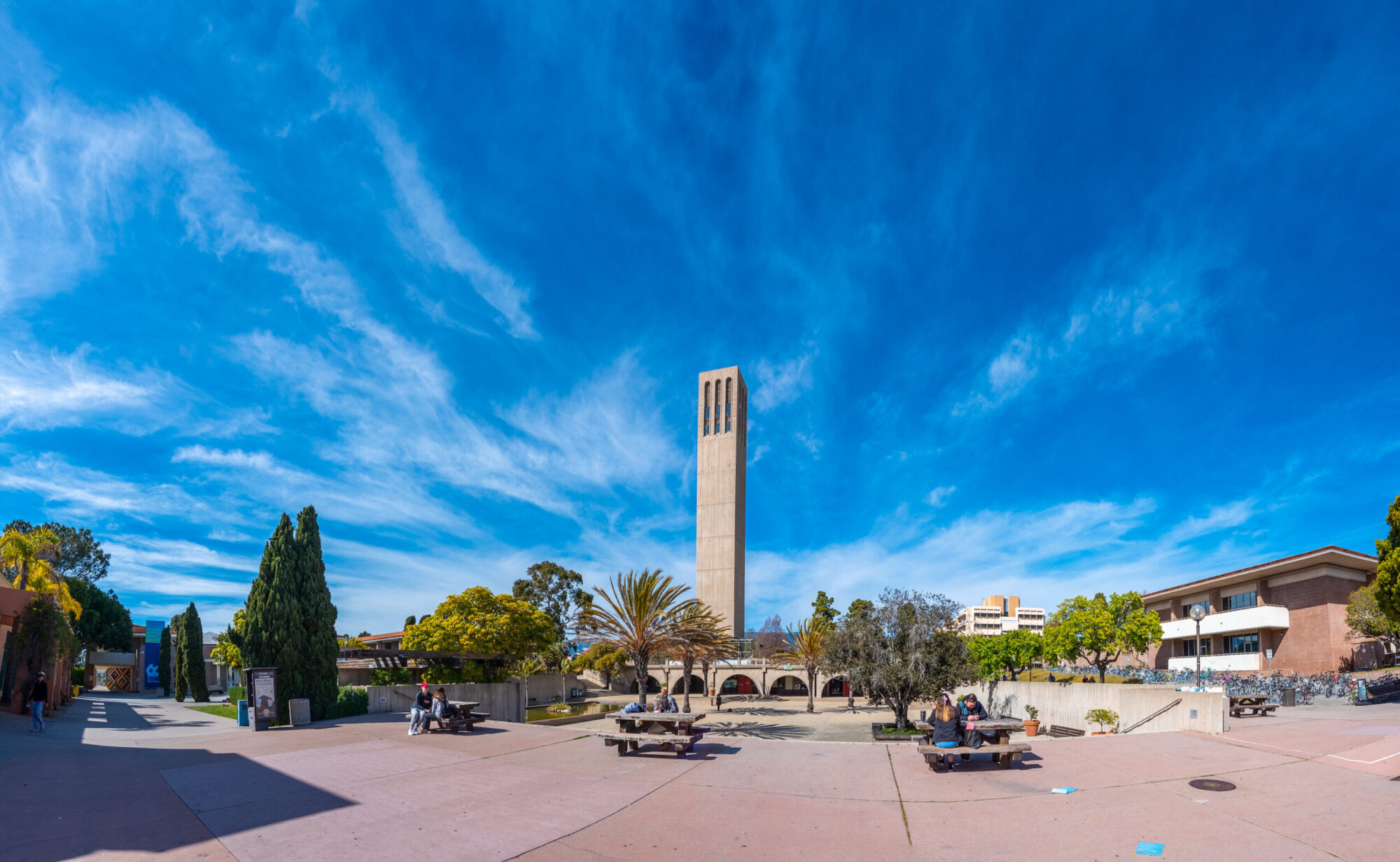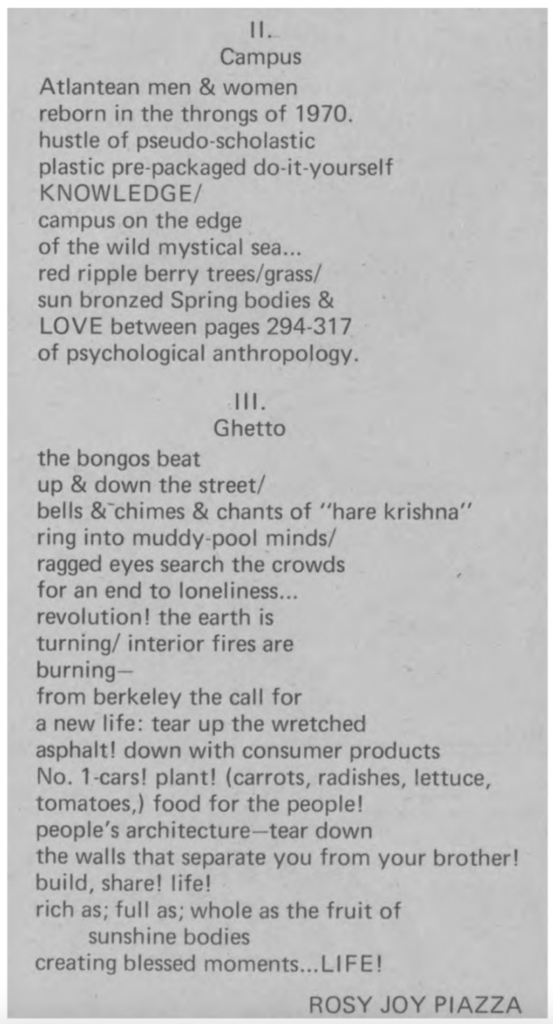
Today’s issue of Headline History is written by Ava Thompson. As a student today, there are a million avenues for information about life in Isla Vista and on campus. Whether it is a niche, an incredibly popular Instagram, a large club, copious flyers, or constant emails, we seem to all be on the same page when it comes to events in town. There are too many activities each weekend for a common Isla Vistan to take part in, but word gets around pretty fast through social media and electronic communication. When you ask a girl or guy in I.V. today, “why don’t you delete your Instagram that your claim to hate so much?” You might be told that they don’t want to miss out on the postings of the latest town happenings like a clothing sale, an A.S controversy, or a weekend concert.
When we imagine a person trying to piece together Isla Vista fifty years from now, their main resource would probably be social media. There is not really one common space for all our communication. Yet, when reading El Gaucho from April and May of 1970, an all encompassing picture of life in Isla Vista fifty-three years ago forms. Without social media and the Gmail app, El Gaucho served as a critical forum for announcements, art, controversy, and advertisement. We can see the cultural struggles and changes of the early 1970’s already rearing their heads in the thoughts of the students and faculty.
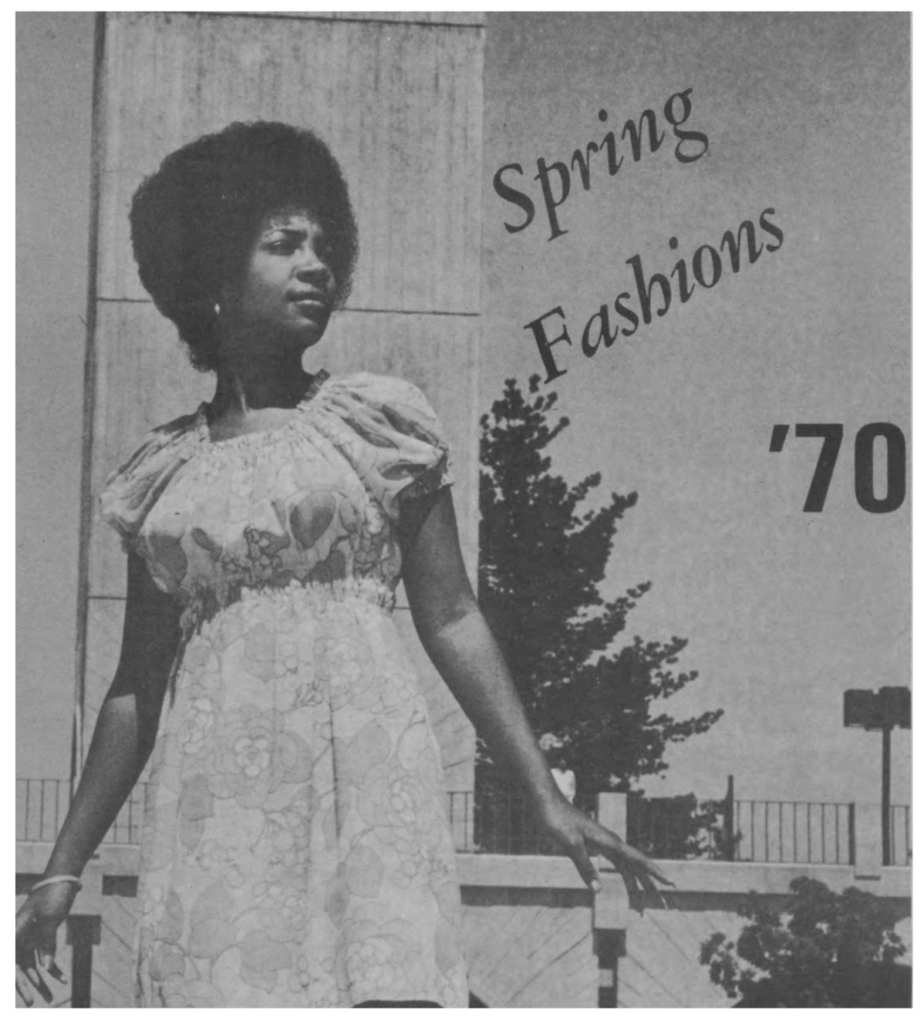
El Gaucho, April 10th, 1970
The newspaper covered what we might expect from the Daily Nexus today in terms of on-campus and community news written by students. But there are many sections which today are less front and center, including advertisements of all sectors, important campus announcements, student art, and conversations around controversial topics. They had a truly multi-faceted expression of the community which, unlike today, could not be accessed in other formats.
These details are revealed, first, in the article content. Throughout El Gaucho, there are copious articles concerning the current United States political happenings including the Vietnam War, the ousting of professor Bill Allen, Elizabeth Taylor at the Oscars, Ronald Reagan’s plan to charge for education, and a Santa Barbara Yippie-welcome for visiting governor Reagan. Through these articles and letters to the editor, it is clear that the campus community was grappling with the feelings of unrest and disagreement both within UCSB and within the country at large. Many cite the coming ‘revolution of change’ and seem to pinpoint college students as the group most poised to act. The faculty wrote openly in El Gaucho about their grievances with campus decisions and their opinions on the Bill Allen controversy. Allen’s impending firing drew huge backlash, as students assumed he was a victim of Regan’s purges of liberal professors. The student community rallied behind him leading to a “riot” where students gathered on campus and played music and sang in support of Allen, but later in the day the event turned chaotic and violent. Today we have social media accounts dedicated to student education on hot button political issues, but you can imagine how in 1970 these articles were important to student awareness and represented a critical avenue of information.
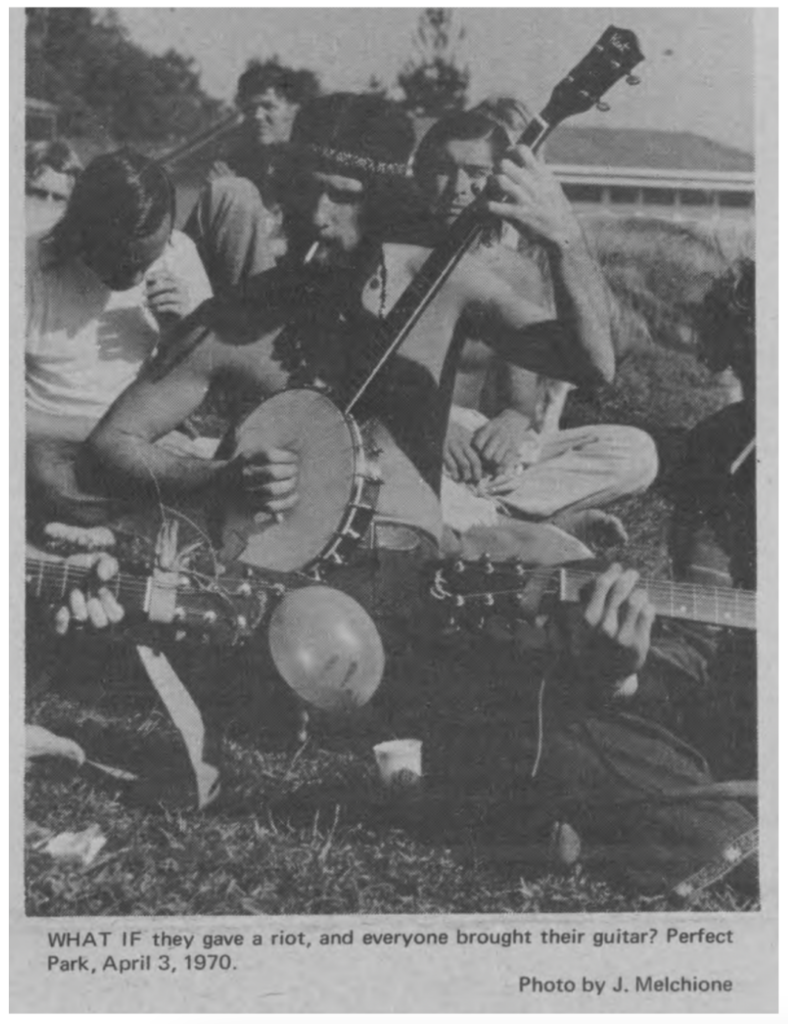
El Gaucho, April 7th, 1970
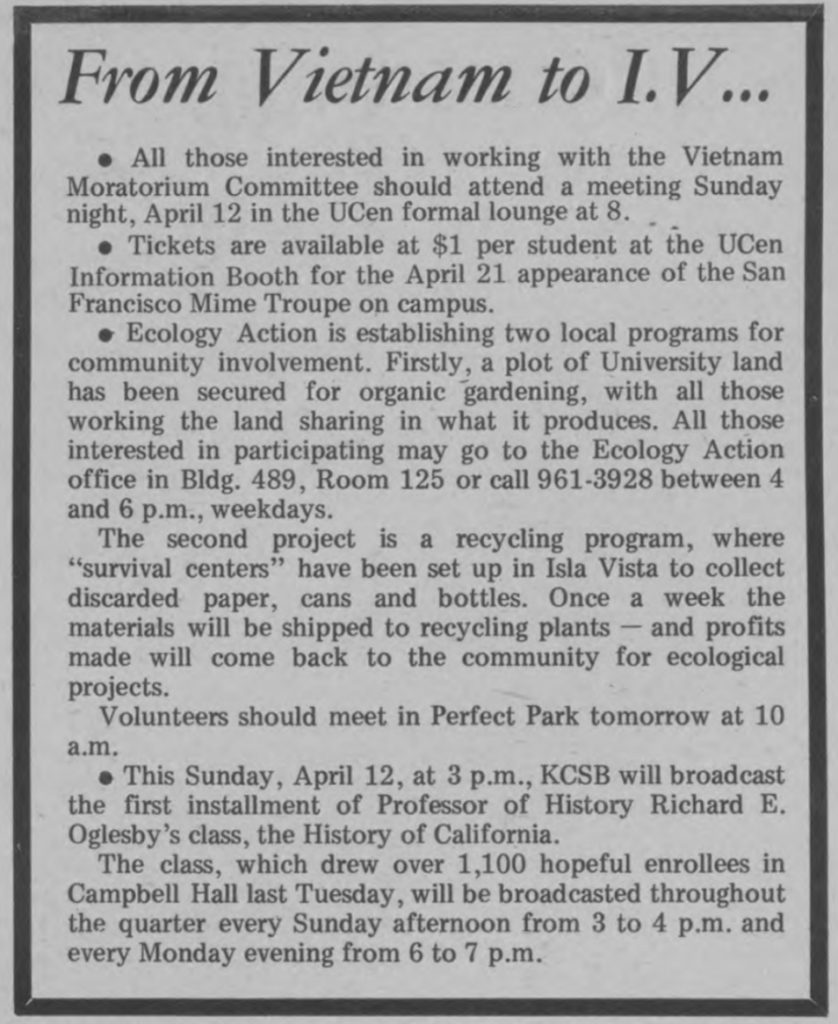
In the April 10th, 1970 issue of El Gaucho, a poem titled “Isla Vista Trilogy” describes life in the town and the feeling of impending change with the new decade. The author, Rosy Joy Piazza, describes campus: “Atlantean men & women reborn in the throngs of 1970. hustle of pseudo-scholastic plastic pre-packaged do-it-yourself KNOWLEDGE/ campus on the edge of the wild mystical sea… red ripple berry trees/grass/ sun bronzed Spring bodies & LOVE between pages 294-317 of psychological anthropology” This stanza encapsulates the feeling that the university itself needed to be changed as an institution while still capturing the free, relaxed feeling of life in Isla Vista. In the third stanza, pictured below, she can hear the calls of change from Berkeley echoing to Santa Barbara.
Towards the bottom, the advertisements begin. They are unusual from what we would expect today. What jumps out first was the many advertisements for engagement rings. This confusion was answered once I got to the announcements sections, but already the advertisements showed a culturally different campus. There were many housing ads to encourage students to live at particular locations within I.V. and Goleta. Interestingly, there were a lot of student-based travel advertisements, selling cheap trips to Europe and Hawaii. Finally tampons and birth control were heavily advertised, using the motif of the independent woman to sell their products. While all these sound like normal advertisements today, each represents services or items which we now turn to the internet or social media to find. Housing is done primarily through websites or Facebook now, while trips are planned on Google flights or opportunities sent through a listserv, tampon companies advertise online or on TV, and many women would not turn to the school newspaper for advice on their birth control today.
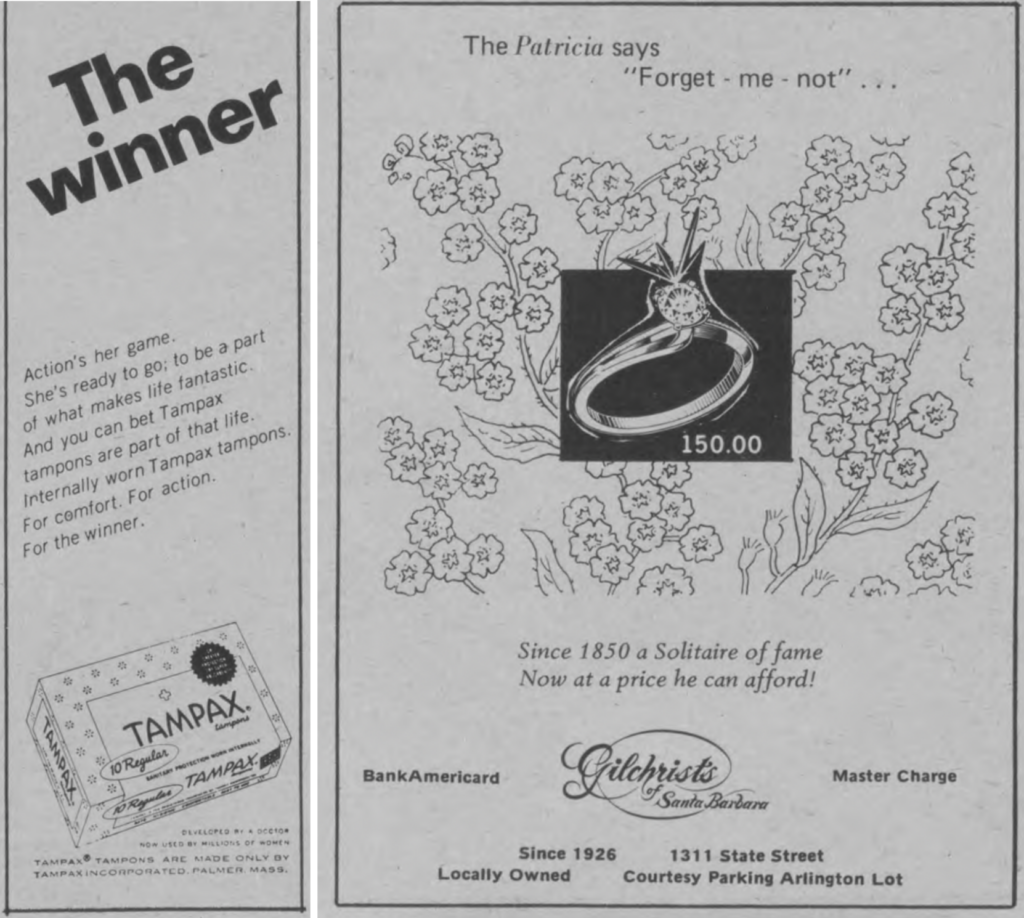
Finally the announcements within the paper illustrated how vital it was to community communication. In one issue, seniors were alerted to the time and location of their senior yearbook portraits. A calendar including all campus events in each issue included talks, concerts, sales, and get-togethers. Finally, in explanation of the engagement rings ads came the engagement announcements section. An announcement like this is now almost exclusively made over social media, and is taboo at our age too. While these are all small details, I felt each showed how the school newspaper served as a critical ground for community communication, expression, and conversation. Today we have spread this out across a hundred platforms and people, each with great benefits and accessibility, but looking back we can see a singular place where I.V spoke to itself.
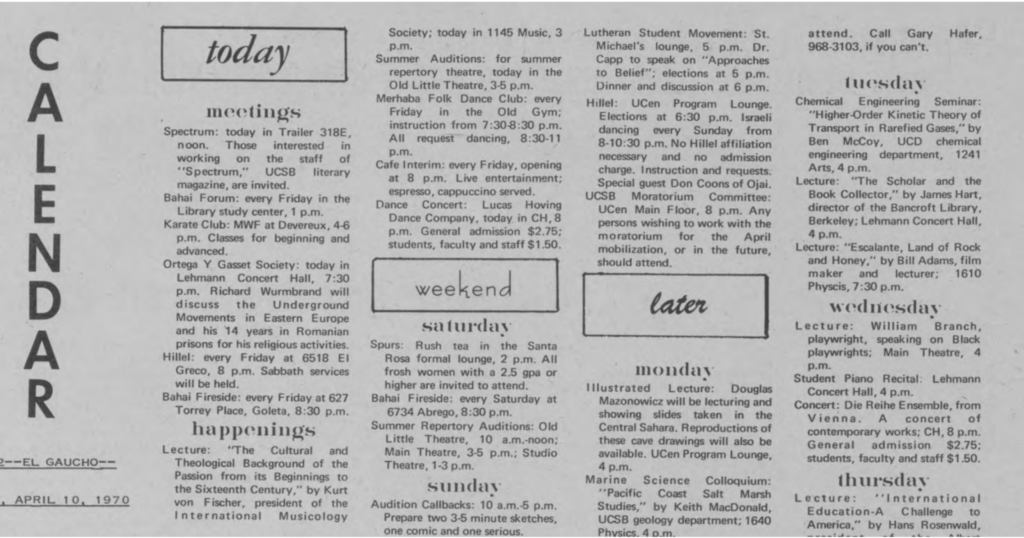
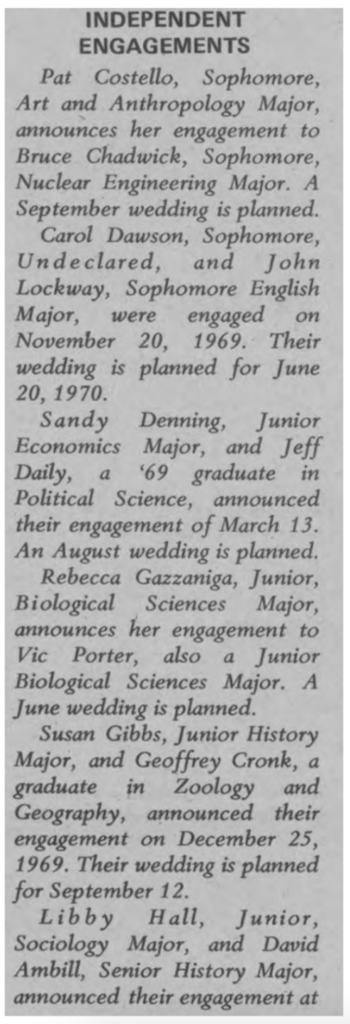
Ava Thompson. Ava is a third-year History of Public Policy and Law major with an English minor. She is an editor at the journal, on the Environmental Affairs board, and a member of UCSB’s Pre-Law Fraternity. Ava is passionate about bridging creative writing and historical analysis in her work at UCSB. In her free time, she does amateur painting, leisurely swimming, and loves to watch reality tv with friends.
